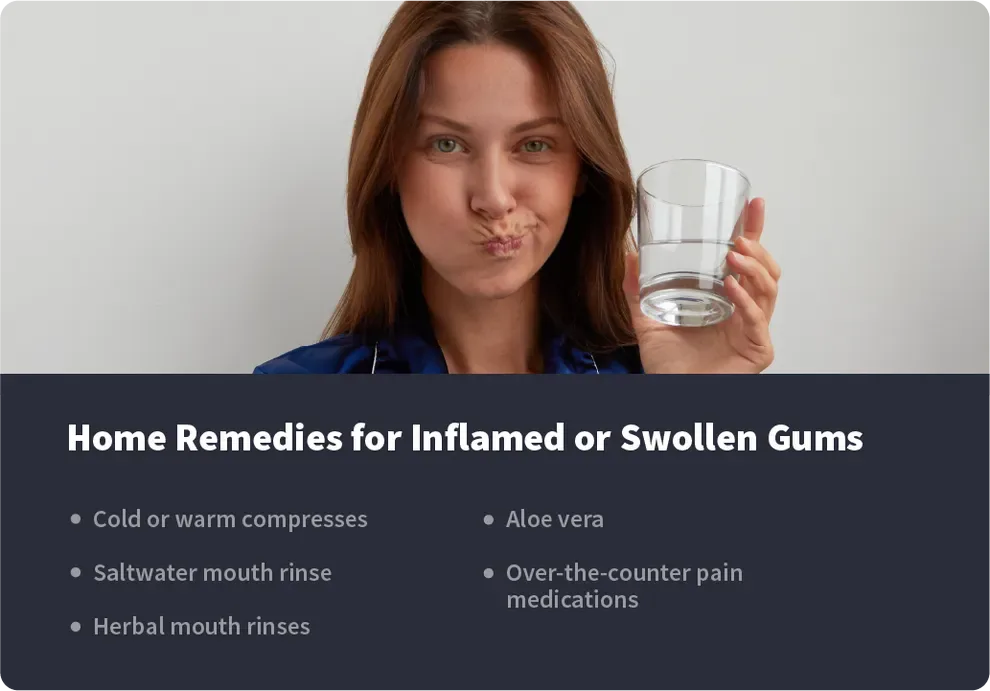Inflamed & Swollen Gums: Major Causes & Prevention

Table of Contents
- Why Are My Gums Inflamed & Swollen?
- Home Remedies for Managing Discomfort
- Treatments
- Prevention
- References
Swollen and inflamed gums can be uncomfortable. If they do not go away on their own after a few hours or a day, you may be in the early stages of gum disease, like gingivitis. Without treatment, gingivitis becomes periodontitis, which can lead to tooth decay and loss, jaw infection, and other problems.
Treatment from your dentist is important, although you can use home remedies like mouth rinses while you wait for your visit. Your dentist will create a treatment plan that might include deep cleaning or antibiotics. You can also prevent gum disease with a good oral hygiene routine.
Why Are My Gums Inflamed & Swollen?
Sometimes, your gums hurt and feel inflamed or swollen. If this sensation goes away, the cause might be temporary irritation. It could be that a kernel of popcorn scraped your gums, you are slightly allergic to something you ate, or your clear aligners bumped your gums.
When swollen, inflamed, or red gums appear, gently rinsing your mouth and brushing your teeth carefully, with a soft-bristled brush, can help to prevent the injury from becoming infected. However, for too many American adults, inflamed and swollen gums are a sign of the early stages of gum disease, most often gingivitis.
There are two main types of gum disease, called periodontal disease: gingivitis, and periodontitis. Although they are different conditions, untreated gingivitis can lead to periodontitis, which is one of the biggest threats to oral health in the United States.
If your gums become darker or red, you develop sensitivity to temperature or sugar that you did not have before, your gums bleed when you brush your teeth, and your gums appear swollen or inflamed, you may have developed gingivitis. While gingivitis is one of the most common forms of gum disease today, you can treat this condition before it gets worse.
Home Remedies for Managing Gum Discomfort

Gingivitis and periodontitis are both inflammatory diseases that affect gum tissue. Swelling, inflammation, redness, and warmth are symptoms of the body’s immune response to harmful bacteria.
It is important to make an appointment with your dentist, who can diagnose the extent of gum disease and develop a treatment plan for you. While you wait, you can use home remedies to alleviate discomfort related to inflamed or swollen gums. Here are some options:
Cold or warm compresses
If you have pain, sensitivity, or inflammation in one area of your face, applying either a warm or a cold compress can ease this feeling and reduce swelling. There is a wide variety of cold and warm compresses available at drug or grocery stores, but you can also make one for yourself at home.
For a cold compress, put some ice in a plastic sandwich bag and wrap it in a towel. Make sure there is enough cloth between your cheek and the ice that you do not make your face too sensitive because of the cold.
Warm compresses involve soaking a towel in warm water or heating up a sock full of rice in the microwave for a few seconds (no longer). Apply the compress to your face for 10 to 20 minutes at a time; then, remove and rest.
For swelling, cold is typically better than warm, but warmth can soothe tense muscles.
Saltwater mouth rinse
Mixing warm, not hot, water with about a teaspoon of salt creates a saline solution that can kill some harmful bacteria in your mouth, which can help to reduce swelling. A study published in 2016 found that rinsing also promoted wound healing.
The American Dental Association (ADA) has long recommended saline rinses to prevent infection after tooth extraction. Although saltwater rinses by themselves will not eliminate an existing infection, they can reduce symptoms by supporting your immune system and helping to kill harmful bacteria.
Herbal mouth rinses
Some herbs or essential oils, like tea tree oil, cloves, peppermint, lemon, and basil can reduce bad breath associated with gingivitis. These have antimicrobial properties.
A study published in 2014 looked at the anti-inflammatory effects of a mouthwash containing tea tree, cloves, and basil, comparing it to a commercial mouthwash, and found that the two had similar benefits, reducing the amount of harmful bacteria and inflammation in the mouth. A 2013 study found that a combination of peppermint, tea tree, and thyme oils killed harmful bacteria in the mouth enough to alleviate symptoms of gingivitis.
Aloe vera
Mixing aloe vera and water, or getting commercially-made aloe vera water, can help to reduce inflammation in your gums. It can also ease pain and heat from infection, according to a 2016 study.
Over-the-counter pain medication
As their name suggests, nonsteroidal anti-inflammatory drugs (NSAIDs), which include naproxen, ibuprofen, and aspirin are all effective at reducing inflammation. If your gums are swollen, taking the recommended dose to alleviate pain and sensitivity can help you feel better throughout your day.
Treatment of Inflamed & Swollen Gums
Unless you have a serious, immediate problem with your oral health, like bleeding gums that will not stop, or inflammation that causes severe pain, you may end up waiting a few days or weeks before you are able to see your dentist. Gingivitis will not significantly worsen during that time, but make an appointment to have your teeth checked when you notice the first signs of gum disease, like swelling, to ensure you aren’t waiting too long to see a dentist.
While you wait, the home remedies above can alleviate some symptoms. You can also focus on softer foods, or those that are not spicy, sugary, or acidic. Investigate ways to quit smoking and reduce alcohol consumption as well, as these both put you at higher risk of gum disease.
Once you can visit your dentist, they will perform a routine examination and talk to you about the symptoms you are experiencing. They may prescribe oral antibiotics or give another antibiotic treatment like an injection.
They may also perform a deep cleaning, which involves cleaning the root surfaces below the gum line. This reduces the size of the gum pockets, or the spaces between your gums and your teeth, which typically get bigger when you have gum disease.
How to Prevent Inflamed Gums
Preventing gum disease like gingivitis, which can cause irritated, swollen, and inflamed gums, starts at home. Brush your teeth twice per day, and floss or use interdental brushes at least once per day. If you are particularly prone to gum disease, you might ask your dentist about mouthwashes that support gum health.
If you have any dental appliances, like dentures, bridges, braces, or clear plastic aligners, make sure these fit well. When they are too tight or too loose, this can irritate your gums, which further increases the risk of gum disease.
Finally, make sure you visit your dentist at least once per year or as often as they recommend. At these visits, they will clean your teeth and check for any early stages of oral health problems.
